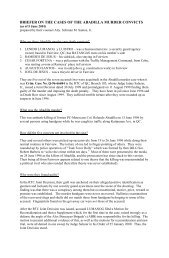Republic of the Philippines - Campaign
Republic of the Philippines - Campaign
Republic of the Philippines - Campaign
Create successful ePaper yourself
Turn your PDF publications into a flip-book with our unique Google optimized e-Paper software.
APPELLANTS’ BRIEF<br />
People <strong>of</strong> <strong>the</strong> <strong>Philippines</strong> vs. Fortuna, et. al.<br />
S. C. G. R. No. 141660-64<br />
ARGUMENTS<br />
I. THE TRIAL COURT ERRED IN IMPOSING AN<br />
UNCONSTITUTIONAL PENALTY, THE DEATH PENALTY,<br />
AT LEAST FOR MURDER UNDER R.A. NO. 7659.<br />
The trial court, in its appealed Joint Decision <strong>of</strong> July 30, 1999, found all accused-<br />
appellants GUILTY <strong>of</strong> MURDER “with <strong>the</strong> aggravating circumstances <strong>of</strong> treachery<br />
(absorbing abuse <strong>of</strong> superior strength) and evident premeditation,” and sentenced each<br />
“to suffer <strong>the</strong> penalty <strong>of</strong> DEATH,” but which, we submit, is an unconstitutional penalty.<br />
R.A. No. 7659, at least ins<strong>of</strong>ar as it classifies murder as a heinous crime and metes <strong>the</strong><br />
death penalty <strong>the</strong>refor, is unconstitutional.<br />
Conventional wisdom has been that “It is a well-established rule that a court<br />
should not pass upon a constitutional question and decide a law [or part <strong>of</strong> it] to be<br />
unconstitutional or invalid, unless such question is raised by <strong>the</strong> parties, and that when it<br />
is raised, if <strong>the</strong> record also presents some o<strong>the</strong>r ground upon which <strong>the</strong> court may rest its<br />
judgment, that course will be adopted and <strong>the</strong> constitutional question will be left for<br />
consideration until a case arises in which a decision upon such question will be<br />
unavoidable.” (Sotto vs. Comelec, 76 Phil. 516, 522; Lalican vs. Vergara, 276 SCRA<br />
518; Co Chiong vs. Dinglasan, 79 Phil. 122)<br />
Thus, in People vs. Pinca (G.R. No. 129256, November 17, 1999), where <strong>the</strong><br />
third issue was <strong>the</strong> constitutionality <strong>of</strong> <strong>the</strong> reimposition <strong>of</strong> <strong>the</strong> death penalty on <strong>the</strong> crime<br />
<strong>of</strong> murder, <strong>the</strong> Court did not find <strong>the</strong> resolution <strong>of</strong> this issue <strong>the</strong> very lis mota <strong>of</strong> <strong>the</strong> case.<br />
Similarly, in <strong>the</strong> earlier parricide case <strong>of</strong> People vs. Malabago (265 SCRA 198), <strong>the</strong><br />
Court also ruled that “Death not being <strong>the</strong> lis mota <strong>of</strong> <strong>the</strong> instant case, <strong>the</strong> Court has to<br />
await for a more appropriate case to pass upon <strong>the</strong> constitutionality <strong>of</strong> R.A. No. 7659, as<br />
amended.”<br />
That has been <strong>the</strong> conventional wisdom. But <strong>the</strong>re is a time also for<br />
unconventional wisdom. To quote by analogy <strong>the</strong> dissenting opinion <strong>of</strong> Mr. Justice<br />
Page 18 <strong>of</strong> 127<br />
18




